
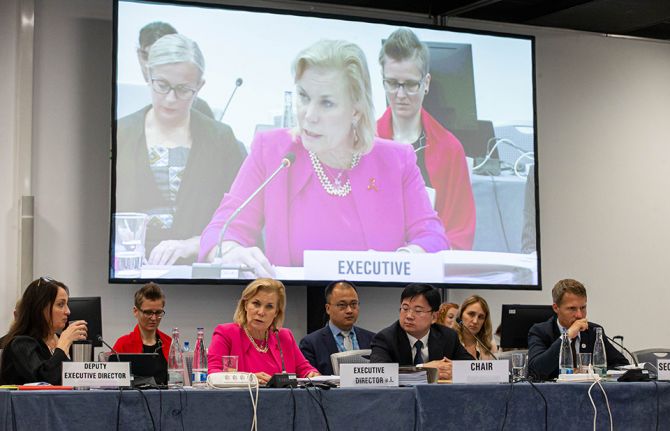
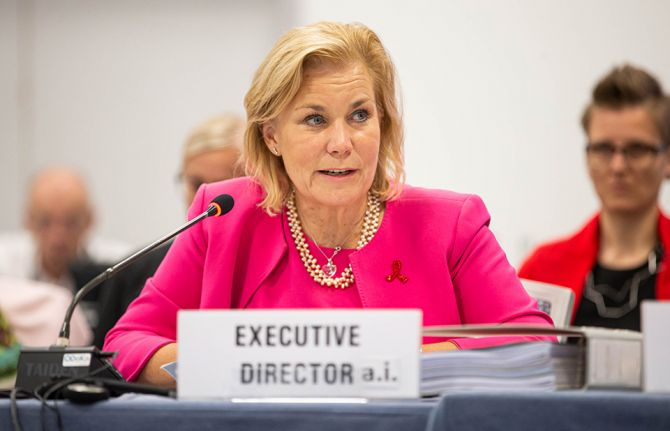
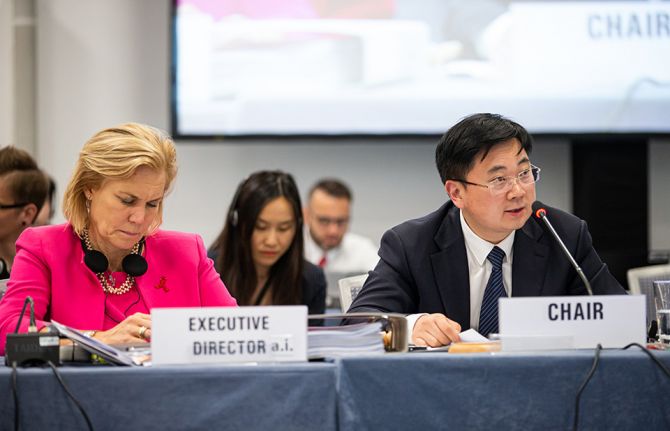
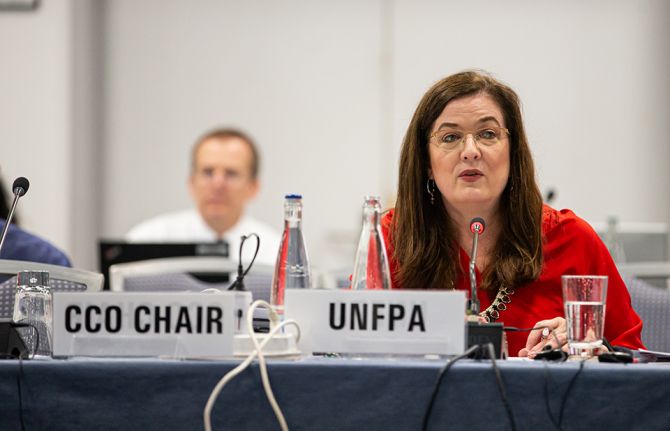
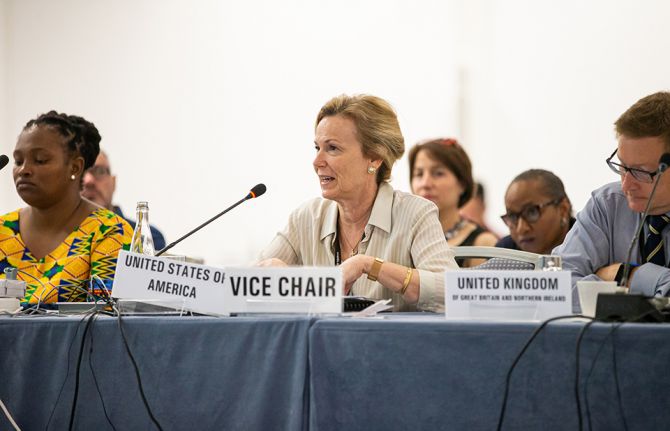
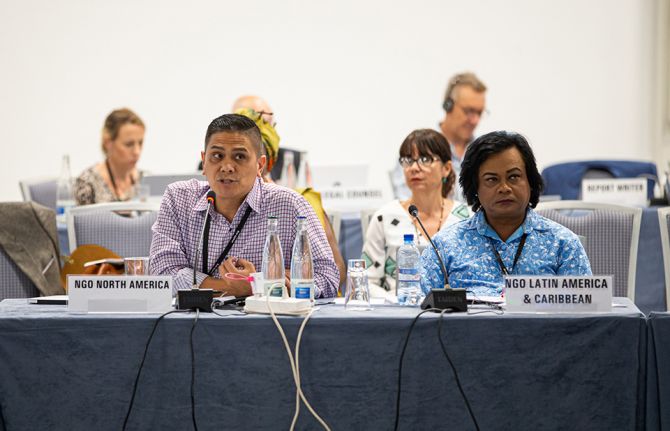
Press Release
UNAIDS Board welcomes the UNAIDS Management Action Plan and advances the nomination process for the next UNAIDS Executive Director
28 June 2019 28 June 2019Board members also approve UNAIDS 2020-2021 budget and the establishment of an independent evaluation function
GENEVA, 28 June 2019—UNAIDS’ 44th Programme Coordinating Board (PCB) meeting has concluded in Geneva, Switzerland. The board, which met from 25-27 June 2019, was presented with a short list of candidates for the position of Executive Director of UNAIDS and heard from the chair of the Search Committee who introduced the Committee’s report.
The Board commended the strong competencies of all short-listed candidates and provided comments on the short list and on the key competencies for the next Executive Director. Members of the Board recognized the integrity of the process and called for the continued protection of the confidentiality of the candidates. The PCB Chair will send the report of the Search Committee, chaired by Yury Ambrazevich, Ambassador of the Republic of Belarus to the United Nations in Geneva, and the recording of the discussions to the Committee of Cosponsoring Organizations, which will make its recommendation to the United Nations Secretary-General. The UN Secretary-General will make the final decision about the appointment of the next Executive Director of UNAIDS.
In her opening address, Gunilla Carlsson, Executive Director a.i. of UNAIDS reiterated the importance of partnerships and of galvanizing political leadership to reach the 2020 Fast-Track targets. “Continuing efforts to eliminate the stigma and discrimination, both HIV-related and more generally, that impedes our work to reach everyone will be necessary to end the AIDS epidemic by 2030,” she said. Ms. Carlsson also thanked the former Executive Director, Michel Sidibé, for his leadership over the last ten years.
Board members also welcomed UNAIDS efforts, through the Management Action Plan, to ensure that the UNAIDS Secretariat is a healthy, equitable and enabling workplace for all staff. Board members heard about the prevention of and the response to harassment from the PCB Working Group, which provided recommendations to the Board to more effectively monitor and guide the work of UNAIDS Secretariat in strengthening and further institutionalizing existing systems to tackle harassment, including sexual harassment, bullying and abuse of authority at the UNAIDS Secretariat. The working group presented their report to the PCB in which they welcomed the actions taken to date by the UNAIDS Secretariat––and the many still planned – to eliminate all forms of harassment from its workplace and to develop a fully enabling workplace environment.
Following on from the thematic segment on mental health and HIV at the 43rd board meeting in December 2018, the board called on member states to implement evidence-based policies and programmes, grounded in human rights to promote mental health and quality of life for people living with and affected by HIV, including addressing stigma and discrimination. They also called on the UNAIDS joint programme to review and revise existing guidelines to ensure better integration between HIV and mental health services.
The Board approved UNAIDS 2020-2021 budget of US$ 484 million and the proposed allocation between the 11 cosponsors and the Secretariat. As part of efforts to strengthen accountability, transparency, organizational learning and change within the UNAIDS Secretariat, UNAIDS Programme Coordinating Board has approved the establishment of an independent evaluation office which reports to the Board.
The Board meeting included a full-day thematic session on Delivering SDG 3: Strengthening and integrating comprehensive HIV responses into sustainable health systems for Universal Health Coverage. Presentations and statements encouraged Universal Health Coverage efforts to heed the lessons of the HIV response: inclusive health governance; community-based services; responsiveness to human rights principles and the needs of the most vulnerable; innovative health financing; and holistic efforts to address the social and structural determinants of health.
Representatives of United Nations Member States, international organizations, civil society and nongovernmental organizations attended the three-day meeting, which was chaired by China, with the United States of America serving as Vice-Chair and Belarus as Rapporteur.
The report to the Board by UNAIDS Executive Director a.i. and the Board’s decisions can be found at https://www.unaids.org/en/whoweare/pcb/44.
UNAIDS
The Joint United Nations Programme on HIV/AIDS (UNAIDS) leads and inspires the world to achieve its shared vision of zero new HIV infections, zero discrimination and zero AIDS-related deaths. UNAIDS unites the efforts of 11 UN organizations—UNHCR, UNICEF, WFP, UNDP, UNFPA, UNODC, UN Women, ILO, UNESCO, WHO and the World Bank—and works closely with global and national partners towards ending the AIDS epidemic by 2030 as part of the Sustainable Development Goals. Learn more at unaids.org and connect with us on Facebook, Twitter, Instagram and YouTube.
Contact
UNAIDS GenevaSophie Barton-Knott
tel. +41 22 791 1697
bartonknotts@unaids.org
UNAIDS Media
tel. +41 22 791 4237
communications@unaids.org
PCB-44
Press centre
Download the printable version (PDF)
